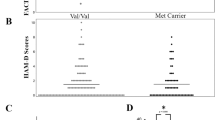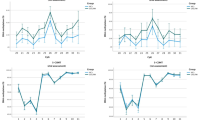Abstract
Cancer-related fatigue and pain after surgery are the most frequent and most incapacitating cancer-related symptoms after breast cancer treatment. Genetic influence of cancer-related fatigue and pain has not been previously investigated. Our aim was to examine the influence of catechol-O-methyltransferase (COMT) Val158Met genotypes on cancer-related fatigue, post-mastectomy pain, and pressure pain hypersensitivity in breast cancer survivors. One-hundred and twenty-eight (n = 128) breast cancer survivors who were treated with radiotherapy and chemotherapy participated in this study. After amplifying Val158Met polymorphisms by polymerase chain reaction, COMT genotype was divided into Val/Val, valine/methionine (Val/Met), or Met/Met. The Piper fatigue scale (PFS) was used to assess cancer-related fatigue. Neck and shoulder/axillary pain intensity was assessed with a numerical pain rate scale (0–10). Finally, pressure pain thresholds (PPT) were assessed bilaterally over the C5–C6 zygapophyseal joints, deltoid muscles, second metacarpal, and tibialis anterior muscles. Breast cancer survivors carrying the Met/Met genotype reported higher levels of fatigue (all subscales, P < 0.001), higher neck pain intensity, and lower PPT over C5–C6 joints and deltoid muscles (all, P < 0.001) relative to those with Val/Met or Val/Val genotypes. The results suggest that breast cancer survivors carrying the Met/Met genotype exhibit higher fatigue, neck pain, and pressure pain hypersensitivity over the neck and shoulder area. This study is important because it strives to understand the factors that predispose some breast cancer survivors to more cancer-related fatigue and increased pain sensitivity.
Similar content being viewed by others
References
Mannisto P, Kaakkola S (1999) Catechol-O-methyltransferase (COMT): biochemistry, molecular biology, pharmacology, and clinical efficacy of the new selective COMT inhibitors. Pharmacol Rev 51:593–628
Strous RD, Bark N, Woerner M, Lachman HM (1997) Lack of association of a functional catechol-O-methyltransferase gene polymorphism in schizophrenia. Biol Psychiatry 41:493–495
Syvanen AC, Tilgmann C, Rinne J, Ulmanen I (1997) Genetic polymorphism of catechol-O-methyltransferase (COMT): correlation of genotype with individual variation of SCOMT activity and comparison of the allele frequencies in the normal population and parkinsonian patients in Finland. Pharmacogenetics 7:65–71
Mao C, Wang XW, Qiu LX, Liao R, Ding H, Chen Q (2010) Lack of association between catechol-O-methyltransferase Val108/158Met polymorphism and breast cancer risk: a meta-analysis of 25,627 cases and 34,222 controls. Breast Cancer Res Treat 121:719–725
Ding H, Fu Y, Chen W, Wang Z (2010) COMT Val158Met polymorphism and breast cancer risk: evidence from 26 case-control studies. Breast Cancer Res Treat 123:265–270
Nagel IE, Chicherio C, Li SC, Von Oertzen T, Sander T, Villringer A, Heekeren HR, Bäckman L, Lindenberger U (2008) Human aging magnifies genetic effects on executive functioning and working memory. Front Hum Neurosci 2:1
Zubieta JK, Heitzeg MM, Smith YR, Bueller JA, Xu K, Xu Y, Koeppe RA, Stohler CS, Goldman D (2003) Val158 met genotype affects μ-opioid neurotransmitter responses to a pain stressor. Science 299:1240–1243
Ahles TA, Saykin AJ, Noll WW, Furstenberg CT, Guerin S, Cole B, Mott LA (2003) The relationship of APOE genotype to neuropsychological performance in long-term cancer survivors treated with standard dose chemotherapy. Psychooncology 12:612–619
Small BJ, Rawson KS, Walsh E, Jim HS, Hughes TF, Iser L, Andrykowski MA, Jacobsen PB (2011) Catechol-O-methyltransferase genotype modulates cancer treatment-related cognitive deficits in breast cancer survivors. Cancer 117:1369–1376
Jim HSL, Donovan KA, Small BJ, Andrykowski MA, Munster PN, Jacobsen PB (2009) Cognitive functioning in breast cancer survivors: a controlled comparison. Cancer 115:1776–1783
Curt GA, Breitbart W, Cella D, Groopman JE, Horning SJ, Itri LM, Johnson DH, Miaskowski C, Scherr SL, Portenoy RK, Vogelzang NJ (2000) Impact of cancer-related fatigue on the lives of patients: new findings from the Fatigue Coalition. Oncologist 5:353–360
Lawrence DP, Kupelnick B, Miller K, Devine D, Lau J (2004) Evidence report on the occurrence, assessment, and treatment of fatigue in cancer patients. J Natl Cancer Inst Monogr 32:40–50
Lauridsen MC, Overgaard M, Overgaard J, Hessov IB, Cristiansen P (2008) Shoulder disability and late symptoms following surgery for early breast cancer. Acta Oncol 47:569–575
Gartner R, Jensen MB, Nielsen J, Ewertz M, Kroman N, Kehlet H (2009) Prevalence of and factors associated with persistent pain following breast cancer surgery. JAMA 302:1985–1992
Andrykowski MA, Curran SL, Carpenter JS, Studts JL, Cunningham L, McGrath PC, Sloan DA, Kenady DE (1999) Rheumatoid symptoms following breast cancer treatment: a controlled comparison. J Pain Symptom Manag 18:85–94
Gottrup H, Andersen J, Arendt-Nielsen L, Jensen T (2000) Psychophysical examination in patients with post-mastectomy pain. Pain 87:275–284
Vilholm OJ, Cold S, Rasmussen L, Sindrup SH (2009) Sensory function and pain in a population of patients treated for breast cancer. Acta Anaesthesiol Scand 53:800–806
Fernández-Lao C, Cantarero-Villanueva I, Fernández-de-Las-Peñas C, Del-Moral-Ávila R, Arendt-Nielsen L, Arroyo-Morales M (2010) Myofascial trigger points in neck and shoulder muscles and widespread pressure pain hyper-sensitivity in patients with post-mastectomy pain: evidence of peripheral and central sensitization. Clin J Pain 26:798–806
Fernández-Lao C, Cantarero-Villanueva I, Fernández-de-Las-Peñas C, Del-Moral-Ávila R, Menjón-Beltrán S, Arroyo-Morales M (2011) Widespread mechanical pain hyper-sensitivity as a sign of central sensitization after breast cancer surgery: comparison between mastectomy and lumpectomy. Pain Med 12:72–78
Andresen KG, Kehlet H (2010) Persistent pain after breast cancer treatment: a critical review of risk factors and strategies for prevention. J Pain. doi:10.1016/j.jpain.2010.12.005
Barsevick AM, Cleeland CS, Manning DC, O’Mara AM, Reeve BB, Scott JA, Sloan JA (2010) ASCPRO (Assessing Symptoms of Cancer Using Patient-Reported Outcomes). ASCPRO recommendations for the assessment of fatigue as an outcome in clinical trials. J Pain Symptom Manag 39:1086–1099
Giacalone A, Polesel J, De Paoli A, Colussi AM, Sartor I, Talamini R, Tirelli U (2010) Assessing cancer-related fatigue: the psychometric properties of the Revised Piper Fatigue Scale in Italian cancer inpatients. Support Care Cancer 18:1191–1197
Bijur P, Silveer W, Gallagher JE (2001) Reliability of the visual analogue scale for measurement of acute pain. Acad Emerg Med 8:1153–1157
Vanderweeen L, Oostendorp RB, Vaes P, Duquet W (1996) Pressure algometry in manual therapy. Man Ther 1:258–265
Chesterson LS, Sim J, Wright CC, Foster NE (2007) Inter-rater reliability of algometry in measuring pressure pain thresholds in healthy humans, using multiple raters. Clin J Pain 23:760–766
Holm S (1979) A simple sequentially rejective multiple test procedure. Scand J Stat 6:65–70
Park JW, Lee KS, Kim JS, Kim YI, Shin HE (2007) Genetic contribution of catechol-O-methyltransferase polymorphism in patients with migraine without aura. J Clin Neurol 3:24–30
García-Fructuoso FJ, Lao-Villadóniga JI, Beyer K, Santos C (2006) Relationship between catechol-O-methyltransferase genotypes and fibromyalgia’s severity. Rheumatol Clin 2:168–172
Khasar SG, Green PG, Miao FJ, Levine JD (2003) Vagal modulation of nociception is mediated by adrenomedullary epinephrine in the rat. Eur J Neurosci 17:909–915
Nackley AG, Tan KT, Fecho K, Flood P, Diatchenko L, Maixner W (2007) Catechol-O-methyltransferase inhibition increases pain sensitivity through activation of both b2- and b3-adrenergic receptors. Pain 128:199–208
Diatchenko L, Slade G, Nackley AGI, Bhalang K, Sigurdsson A, Belfer I, Goldman D, Xu K, Shabalina SA, Shagin D, Max MB, Makarov SS, Maixner W (2005) Genetic basis for individual variations in pain perception and the development of a chronic pain condition. Hum Mol Genet 14:135–143
Rakvag TT, Klepstad P, Baar C et al (2005) The Val158Met polymorphism of the human catechol-O-methyltransferase (COMT) gene may influence morphine requirements in cancer pain patients. Pain 116:73–78
Ross JR, Riley J, Taegetmeyer AB, Sato H, Gretton S, du Bois RM, Welsh KI (2008) Genetic variation and response to morphine in cancer patients: catechol-O-methyltransferase and multidrug resistance-1 gene polymorphisms are associated with central side effects. Cancer 112:1390–1403
Kurzrock R (2001) The role of cytokines in cancer-related fatigue. Cancer 92:S1684–S1688
Collado-Hidalgo A, Bower JE, Ganz PA, Cole S, Irwin M (2006) Inflammatory biomarkers for persistent fatigue in breast cancer survivors. Clin Cancer Res 12:2759–2766
Maier SF, Watkins L (2003) Immune-to-central nervous system communication and its role in modulating pain and cognition: implications for cancer and cancer treatment. Brain Behav Immun 17(suppl 1):S125–S131
Bower JE (2007) Cancer-related fatigue: links with inflammation in cancer patients and survivors. Brain Behav Immun 21:863–871
Cantarero-Villanueva I, Fernández-Lao C, Fernández-de-las-Peñas C, Díaz-Rodríguez L, Sanchez-Cantalejo E, Arroyo-Morales M (2011) Associations among musculoskeletal impairments, depression, body image and fatigue in breast cancer survivors within the first year after treatment. Eur J Cancer Care. doi:10.1111/j.1365-2354.2011.01245.x
Hamburg MA, Collins FS (2010) The path to personalized medicine. N Engl J Med 363:301–304
Reyes-Gibby CC, Wu X, Spitz M, Kurzrock R, Fisch M, Bruera E, Shete S (2008) Molecular epidemiology, cancer-related symptoms, and cytokines pathway. Lancet Oncol 9:777–785
Acknowledgments
The study received some funds from the Fundación Sánchez Ibarra 2011, Spain.
Conflict of interest
None declared.
Author information
Authors and Affiliations
Corresponding author
Rights and permissions
About this article
Cite this article
Fernández-de-las-Peñas, C., Fernández-Lao, C., Cantarero-Villanueva, I. et al. Catechol-O-methyltransferase genotype (Val158met) modulates cancer-related fatigue and pain sensitivity in breast cancer survivors. Breast Cancer Res Treat 133, 405–412 (2012). https://doi.org/10.1007/s10549-011-1757-y
Received:
Accepted:
Published:
Issue Date:
DOI: https://doi.org/10.1007/s10549-011-1757-y




